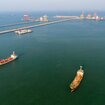Our new NorthStandard site is now live. There will be no new content or updates added to this site. For the latest information, please visit our new site north-standard.com.
Sanctions
Financial sanctions are utilised as a foreign policy tool to coerce a state or a regime to change its behaviour. They can be imposed on individuals or companies and can take the form of an asset freeze and/or a travel ban or more targeted restrictions such as prohibiting the import/export of key economic resources.
Failure to adhere to sanctions can result in reputational damage, loss of insurance cover, mortgage foreclosure as well as huge fines and/or imprisonment. Over the last few years, sanctions imposed by the UN, EU and US have greatly impacted the maritime industry directly and also financial institutions and insurers, including P&l clubs. This can be challenging for members as they may find themselves subject to complex and conflicting sanctions regimes.
Main sanctions regimes
UN sanctions derive from UN Security Council Resolutions which require member states to implement them in their domestic legislation. In the EU they are implemented through regulations that have direct effect in EU member states.
EU sanctions are imposed as part of the EU Common Foreign and Security Policy. They apply to:
- all EU nationals including entities incorporated or constituted under the law of an EU member state anywhere in the world;
- all business done by EU and non-EU nationals in whole or in part within the EU including its airspace and on any aircraft or vessel under an EU member state’s jurisdiction.
EU sanctions may affect non-EU members if they are directed at insurers, even where the ship, the parties and the particular trade has no connection to the EU.
Under most EU sanctions, there is a defence if you did not know or had no reasonable cause to suspect that your actions had caused a breach of sanctions. This means that if appropriate due diligence has been undertaken, and no suspicion has been reasonably aroused, then no offence has been committed even if it turns out that there has been an infringement. But what constitutes appropriate due diligence will depend on the particular facts of the case.
EU sanctions provide that member states should implement ‘effective, proportionate and dissuasive’ penalties at national level.
UK sanctions
From 11pm on 31 December 2020, EU sanctions ceased to apply in the UK. The UK’s financial sanctions framework is now regulated by the Sanctions and Anti-Monetary Laundering Act 2018 (the Sanctions Act). The UK has introduced regulations under the Sanctions Act, which implements UN sanctions and broadly mirrors sanctions imposed by the EU, but they are not identical. Further details are provided in the article ‘UK sanctions after Brexit: what has changed’, which is available here.
The Office of Financial Sanctions Implementation (OFSI), which is part of the UK Treasury, is responsible for enforcing financial sanctions in the UK. Further details are available here. The maximum value of a financial penalty imposed by OFSI ranges from 50% of the estimated value of the funds subject to the breach of sanctions or £1m (whichever is higher). Penalties imposed by the criminal courts include up to seven years in prison.
US sanctions are implemented under Presidential powers (Executive Orders) and domestic legislation. These ‘primary sanctions’ apply to:
- US citizens and permanent residents wherever located
- US entities organised under US law and their foreign branches
- persons physically in the US (regardless of citizenship)
- foreign entities owned or controlled by a US person.
With respect to sanctions against Iran and Cuba, non-US entities owned or controlled by US persons are also considered to be US persons for the purpose of these sanctions.
There are also US sanctions with extra-territorial effect that apply to non-US persons i.e. ‘secondary sanctions’ which are designed to prevent non-US persons from transacting business with targets of US primary sanctions. Secondary sanctions have mainly been imposed in connection with Iran, North Korea and Venezuela.
In the US, financial sanctions are enforced by the US Office of Foreign Assets Control (OFAC) which is part of the US Treasury Department. Strict liability applies, meaning that there is no need to provide intent or a finding of fault. Criminal penalties include fines of up to $1m and/or 20 years in prison or both. Civil penalties include fines of up to $250,000 or twice the amount of the underlying transaction. Other penalties include seizure/forfeiture of the goods involved.
Sanctions lists
A key part of most sanctions measures is an asset freeze against named individuals, companies and other entities. This means that their funds and economic resources are frozen and it is prohibited to make funds or economic resources available to them. Under US sanctions 'entities directly or indirectly owned 50% or more in the aggregate by one or more blocked persons' ie sanctioned individuals or entities that are known as Specially Designated Nationals (SDNs) are themselves considered to be SDNs. Further details can be found on the US Treasury Department website here.
Similarly, under EU sanctions, entities owned 50% or more by a sanctioned individual or entity are themselves considered to be sanctioned. However, under EU sanctions, this includes entities 'controlled' by a sanctioned individual or entity. The EU Council has issued guidelines on the criteria to be taken into account when assessing ownership or control by a sanctioned entity and when considering whether a party is affected by asset freezes. Further details are available here.
The current consolidated list of asset freeze targets designated under UN and EU financial sanctions can be found here.
The consolidated list of asset freeze targets designated under UN and UK financial sanctions can be found here.
The current list of asset freeze targets designated under US sanctions (the SDN list) can be found here.
These lists are amended on an ongoing basis with little or no prior notice so members should ensure that they are closely monitored.
Due diligence
The club cannot confirm whether a particular trade or shipment will breach sanctions. Members must exercise their own due diligence and make enquiries so that they can satisfy themselves as to whether their trading activities will expose them to the risk of breaching sanctions. This will include:
- identifying which sanctions regimes apply to a transaction (which includes considering the country of loading, transit, transhipment and discharge);
- investigating whether the particular trade, voyage or operation is subject to any prohibitions or restrictions
- reviewing whether any of the parties involved, e.g. owners, charterers, sub-charterers, cargo interests (e.g. shippers, receivers, consignees, buyers and sellers), port operators, bunker suppliers or local agents, etc are named on the relevant sanctions list(s) or are owned and/or controlled by entities named on the sanctions list(s).
Sanctions regimes change regularly, eg a cargo that was not previously prohibited may become subject to sanctions during a voyage. We therefore recommend that members should consider inserting sanctions clauses in their charterparties, eg BIMCO sanctions clauses for time and voyage charterparties.
Members will need to carry out enhanced due diligence in high-risk jurisdictions (eg Iran, Syria, North Korea, etc) as there has been evidence of deceptive shipping practices in these areas, eg physically altering a vessel’s identification, falsifying shipping documents, manipulating AIS (the automatic identification system) on vessels and carrying out illicit ship-to-ship cargo operations (to conceal the origin or destination of the cargo).
On 14 May 2020, the US authorities issued a Global Advisory to the Maritime Industry, which provided detailed guidance to ship owners, charterers, flag registries and insurers regarding emerging trends related to illicit shipping practices. A copy of the advisory is available here. It sets out recommendations in terms of risk management and due diligence. Although its recommendations are not mandatory, it demonstrates US OFAC’s increasing focus on the maritime industry as a means to implement and enforce sanctions policies. A web alert issued by the club which provides some guidance is available here and the International Group’s response to the Advisory is available here.
On 2 May 2019, US OFAC published a Framework for OFAC Compliance Commitments (the Compliance Framework), which is available here It strongly encourages companies subject to US jurisdiction and foreign entities that conduct business in or with the US or involving US-origin goods or services to develop a risk-based approach to sanctions. It also sets out OFAC’s expectations of the essential elements of an effective sanctions compliance programme and recommends that it should include the following five components:
- Senior management commitment which should include arranging direct reporting lines to senior management and promoting a 'culture of compliance' within the company.
- Risk assessment that properly takes account of the sanctions’ risks relevant to the business. This includes developing an onboarding process for new customers through a Know-Your-Customer process. It also expects companies to develop a methodology to identify, analyse and address any risks it identifies, which should be monitored and updated to respond to any systemic risks identified by the company during its business operations.
- Risk-based internal controls including written policies and procedures tailored to the business and sanctions risk in order to identify, prevent, escalate, report and record activities that are prohibited by sanctions’ programmes. These controls should be flexible enough to respond to new legislation and/or sanctions risks.
- Testing and auditing sanctions procedures to ensure that they are effective and adapt to any changes in the sanctions’ environment.
- Providing training to all relevant employees' on a regular basis (at least once a year) and assess employees understanding of the training.
The Compliance Framework does not impose any legal requirements on US persons, persons doing business with the US or persons subject to secondary sanctions. It does however set out the standards that OFAC will apply in evaluating the adequacy of a sanctions compliance programme under its Enforcement Guidelines. It has also made it clear that a failure to adopt the Compliance Framework increases the likelihood and severity of penalties being imposed on a company that is found to have breached US sanctions.
Club cover
Members should be aware of the club’s sanctions rules (ie P&I rules 4.8, 6.22 and 17.2(5) or their equivalent), which are set out in full in the club’s rule books here.
Rule 4.8: 'No claim is recoverable if it arises out of [the ship] …being employed in an unlawful, prohibited or sanctionable carriage, trade, voyage or operation, or if the provision of insurance … is unlawful, prohibited or sanctionable…'
Rule 6.22: 'The member shall in no circumstances be entitled to recover from the club that part of any liabilities which is not recovered by the club from [pooling agreement partners or reinsurers] … by reason of any sanction, prohibition or adverse action against them by a state or international organisation…'
Rule 17.2(5): 'A member shall cease to be insured by the club in respect of any ship entered by him if … the ship is employed by the member in a carriage, trade, voyage or operation which will thereby in any way howsoever expose the club to the risk of being or becoming subject to any sanction, prohibition or adverse action in any form whatsoever by any state or international organisation, unless the managers shall otherwise determine.'
Members need to be aware that even if they are not breaching sanctions, cover for the ship will automatically cease if the club is at risk of being exposed to sanctions (rule 17.2(5)). Furthermore, even if the particular trade or the provision of insurance is not subject to sanctions, many banks have blanket policies in place whereby they are unable to process payments linked to high-risk jurisdictions, which may affect the club’s ability to provide assistance in the event of a claim.
We strongly urge members to ensure that their sanctions compliance procedures are robust, proactive and up to date. If members have any sanctions queries, they should contact their usual club contact in the first instance. We have a P&I sanctions team, which includes representatives from our offices in London, Piraeus, New York and Singapore, who are experienced in dealing with sanctions queries. They can provide general guidance on sanctions, advice on cover issues and recommend specialist sanctions lawyers.
Other Jurisdictions
Details of US and EU sanctions in respect of Iran, Ukraine/Russia, Syria, Cuba, North Korea and Venezuela are available on their respective pages.
Knowledge & News
14 July 2023
Russian crude oil now trading above EU / G7 Price Cap
22 December 2022
EU adopts 9th package of Russia sanctions
9 December 2022
Sanctions: Russian oil price cap
9 December 2022
9 December 2022, Standard Asia circular - The Russian Oil Price Cap
9 December 2022
9 December 2022, Standard Ireland circular - The Russian Oil Price Cap
Key contacts
-
Ursula O'Donnell
Head of Claims - Offshore & Renewables
-
Gina Venezia
General Counsel / Head of Commercial - Americas
-
Annie Kalogianni
Claims Senior Executive - Greece
-
Sandros Koutouroushis
Claims Senior Executive - Mediterranean
-
Yassmin Hamzeh
Claims Executive - Middle East, India & Africa
View all key contacts
-
Anna Doumeni
Claims Director - Greece
-
Ewa Szteinduchert
Head of P&I Claims - Mediterranean
-
Johanna Laban
Claims Senior Executive - Coastal & Inland
-
Laura Ronan
Claims Director - Mediterranean
-
Peter Smith
Claims Senior Executive - Americas, UK & Ireland















